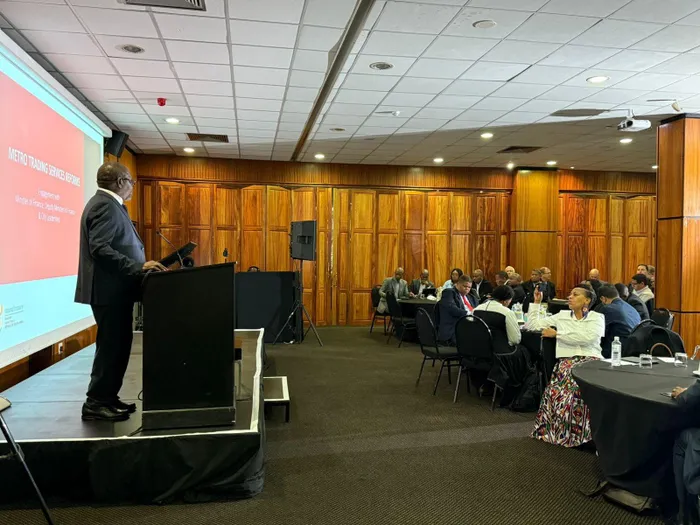Godongwana unveils Metro Trading Services reforms to tackle municipal underinvestment
FISCAL REFORMS

Finance Minister Enoch Godongwana speaking at a Metro Trading Services Reform engagement session with executive mayors at the CSIR in Pretoria on Monday.
Image: Supplied/X
Finance Minister Enoch Godongwana has called for urgent reforms in the way South Africa’s metros manage their core trading services, warning that years of underinvestment in water, sanitation and electricity have left cities struggling to support growth and attract investment.
Speaking at a Metro Trading Services Reform engagement session with executive mayors on Monday, Godongwana said the country’s stagnant economy and rising unemployment had put severe pressure on public finances.
The National Treasury implemented these reforms to restore and sustain trading services such as electricity, water, sanitation, and waste services in metros through institutional and financial reforms.
Godongwana noted that municipalities are unable to expand bulk infrastructure in fast-growing areas such as Lanseria in Johannesburg, Mooikloof in Tshwane, and Cape Town’s West Coast, limiting property development and revenue generation.
“This means that metros cannot collect additional revenue in the form of property rates, nor can they add paying customers to water and electricity businesses,” he said.
“Considering the declining water and electricity margins, which we are fully aware of due to double-digit bulk purchases, municipalities are in a difficult position. This is a trend that we cannot continue to be spectators to. We need to arrest this in the interest of our country.”
The minister announced the Metro Trading Services Reform, which includes restructuring the grant system to introduce performance-based incentives.
The intention, he said, is to encourage metros to channel more resources into critical infrastructure, using both borrowing and internally generated funds, alongside targeted grants such as the Urban Settlement Development Grant.
Treasury has implemented a six-year, R54 billion performance-linked incentive grant complemented by technical assistance to strengthen institutional accountability and financial transparency for performance.
Godongwana said the metro trading services is one area where mayors can immediately learn together and collaborate, not only to unlock the economy but improve metros' financial position.
“Our approach is to work with you in a complementary way by creating an incentive-based grant for the trading services. This will create accountability and predictability in grant allocation to metros and the national government, respectively,” Godongwana said.
“Our vision is to use the incentive to ignite investment in metros. Our expectation is that through this incentive, your respective metros will invest additional money in this targeted infrastructure through borrowing and internally generated funds. In addition, we also expect the Urban Settlement Development Grant to start to be directed to invest in this critical infrastructure.
“Through this reform, we have committed funds in the form of grants to you, and we will continue to allocate more resources in subsequent years. We want to partner with you through investing in infrastructure that has positive economic and spatial implications.”
Godongwana also stressed that reforms must also address institutional weaknesses, calling for fully integrated trading services within municipalities and the hiring of competent professionals with both engineering and business acumen.
“We need to collapse this split in responsibility and ensure that we establish fully integrated trading services that are responsive to our sophisticated economy. We also need to commit to not only hiring competent people but also to giving them full responsibility to run integrated businesses,” Godongwana said.
“Councils need to ensure that a split in responsibilities to continue to hamstring municipalities to establish utilities of the future. In addition, councils also need to ensure that competent people with engineering and business acumen are hired in these positions. We should not make the mistake that Eskom made by hiring people who lack a combination of trading services and business acumen.”
Meanwhile, deputy minister of finance, Ashor Sarupen, said South Africa was spending 7.7% of its gross domestic product (GDP) on local government but produced far less outcomes compared to neighbouring countries that spent less such as Lesotho and Namibia.
"And so we need to ask ourselves, what is it that they are getting right? And that's usually efficiency, confronting and eliminating corruption, appointing talented people," Sarupen said.
"And I'm very heartened to hear mayors speak about getting the right people into heading their trading services and getting the right skills. The metro trading services system means that money comes from reform implementation. And that is absolutely critical. So I think it's important to see the trading services reform process as a virtuous cycle."
BUSINESS REPORT